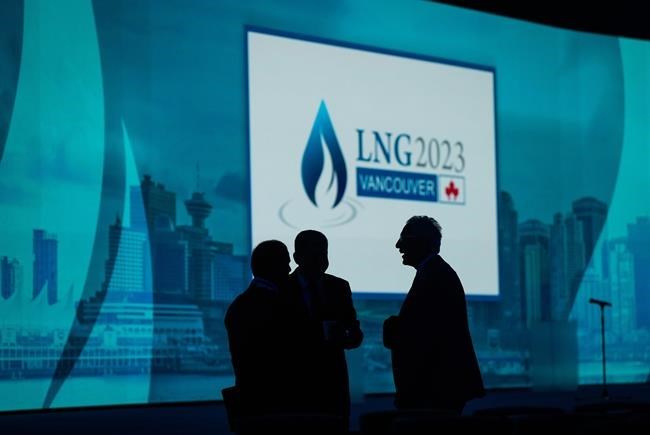VANCOUVER — Volatility in the supply and price of natural gas worldwide since Russia's invasion of Ukraine shows the value of the LNG Canada project as a source of "affordable, reliable" and "responsibly produced" liquefied natural gas, the project's CEO said.
"I can't think of any country better placed to supply Asia with exactly that than Canada," said Jason Klein of LNG Canada, the massive export facility currently under construction in Kitimat, B.C.
Klein said the $40-billion project is close to 85-per-cent complete and will aim to compete globally, not only on price but also its environmental and social track record.
Klein made the comments at the opening of the LNG 2023 conference in Vancouver, an event that was originally scheduled for last year in the Russian city of St. Petersburg before being moved to B.C. because of the war in Ukraine.
That situation, Klein said, may be the best example of the value of Canadian energy and its stability on the world stage.
"I think it's an amazing opportunity to reflect on the fact that the very act that causes us to be in Vancouver today is the same one that's upending global energy markets," Klein said.
The LNG 2023 conference runs until Thursday, drawing multinational energy corporations such as energy giants Petronas, BP and ConocoPhillips, as well as government representatives from key producing countries such as Qatar. The conference is held every three years.
Organizers said the discussion at the conference would be centred around economic consequences of market upheaval. The disappearance of Russia, the world's largest natural gas exporter, from Western supply chains was at the forefront of several conference panels.
Experts said that while Europe took the brunt of losing Russian gas supplies, Asia also suffered, because European buyers pushed up the prices for liquefied natural gas globally, and many countries struggled to secure supply.
Sarah Bairstow, president and chief commercial officer for U.S. LNG producer Mexico Pacific, said that was why the industry should keep its attention on Asia — which she described as the "demand engine" for the commodity.
"What we've seen as a result of the last 12-15 months is Asia-Pacific buyers … they know they need baseline gas supply not only for their own generation, but also for their own energy transition goals," Bairstow told the conference. "And they are really seeking to get ahead of the curve of Europe."
Canadian organizers of the conference said that, in addition to stability, First Nations economic reconciliation is a major part of what the sector wants to present to the global natural gas industry.
First Nations LNG Alliance chair Crystal Smith told the conference that more extensive Indigenous community involvement is on the way in projects such as the planned Cedar LNG facility in Kitimat.
"I think about where our community was even 10 years ago in regards to our participation in our economies," Smith said of Haisla Nation's ownership of the project.¬Ý
"We essentially sat on the sidelines and watched everybody in our territory and surrounding area proper … to now, I can't help but smile and get absolutely emotional at being majority owners of Cedar LNG."
This report by The Canadian Press was first published July 10, 2023.
The Canadian Press





